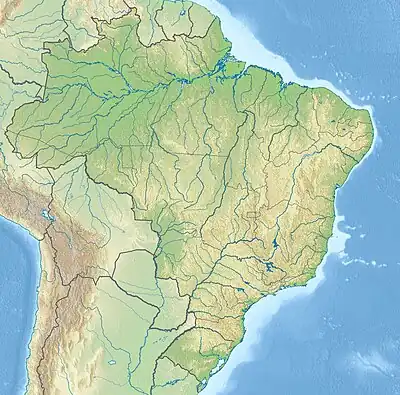| Taiamã Ecological Station | |
|---|---|
| Estação Ecológica de Taiamã | |
 Location in Brazil | |
| Location | Cáceres, Mato Grosso, Brazil |
| Coordinates | 16°51′11″S 57°30′18″W / 16.853°S 57.505°W |
| Area | 11,555 hectares (28,550 acres) |
| Designation | Ecological station |
| Created | 2 June 1981 |
| Designated | 21 October 2018 |
| Reference no. | 2363[1] |
Taiamã Ecological Station (Portuguese: Estação Ecológica de Taiamã) is an ecological station in the Mato Grosso state of Brazil.
Creation
In the 1970s the Special Secretariat of the Environment under the environmentalist Paulo Nogueira Neto launched a program of estações ecológicas (ecological stations) with the aim of establishing a network of reserves that would protect representative samples of all Brazilian ecosystems. Several stations were created in 1981, of which the Taiamã Ecological Station was the only one in the Pantanal,[lower-alpha 1] created by decree on 2 June 1981.[2]
The Taiamã Ecological Station is in the Cáceres and Poconé municipalities of Mato Grosso.[3] It consists of the island of Taiamã, which covers a total area of 11,555 hectares (28,550 acres) and is bordered by the Paraguay and Bracinho rivers.[2] The purpose is to preserve nature and support scientific research.[3]
Environment
The station consists mostly of flooded fields, but includes permanent and temporary lakes, ponds and meandering streams, strongly influenced by seasonal fluctuations of the Paraguay River.[2]
_male%252C_Pantanal%252C_Brazil_2.jpg.webp)
The vegetation of the Pantanal is mainly influenced by the Cerrado biome, but also has elements from the Amazon rainforest, Gran Chaco and Atlantic Forest.[3] There are large fields of grass interspersed with areas of forest, and riparian forest along the rivers around the station. Water plants such as water hyacinth (eichhornia crassipes) provide shelter for fish to lay their eggs. Islands of water hyacinth floating down river during floods transport many animal and plant species.[2] The region is notable for its extraordinary concentration and abundance of wildlife.[3] Migratory birds include vermilion flycatcher (pyrocephalus rubinus), American cliff swallow (hirundo pyrrhonota), barn swallow (hirundo rustica) and purple martin (progne subis).[3]
Status
As of 2009 the Ecological Station was a "strict nature reserve" under IUCN protected area category Ia, with a terrestrial area of 11,200 hectares (28,000 acres).[4] Endangered species in the ecological station include the jaguar (Panthera onca), giant otter (Pteronura brasiliensis) and marsh deer (Blastocerus dichotomus).[2] Since 2018 the station has been designated as a protected Ramsar site.[1]
References
- ↑ The Pantanal is one of the largest wetland areas in the world, with an area of almost 600,000 square kilometres (230,000 sq mi) in the upper Paraguay River basin, of which 363,000 square kilometres (140,000 sq mi) is in Brazil.[2]
- 1 2 "Taiamã Ecological Station". Ramsar Sites Information Service. Retrieved 11 January 2019.
- 1 2 3 4 5 6 Estação Ecológica de Taiamã: História – ICMBio.
- 1 2 3 4 5 Unidade de Conservação ... MMA.
- ↑ Triana 2009.
Sources
- Estação Ecológica de Taiamã: História (in Portuguese), ICMBio, retrieved 2016-04-18
- Triana, Elisa (29 May 2009), "Strict Nature Reserves in Brazil", The Encyclopedia of Earth, retrieved 2016-04-15
- Unidade de Conservação: Estação Ecológica de Taiamã (in Portuguese), MMA: Ministério do Meio Ambiente, retrieved 2016-04-18